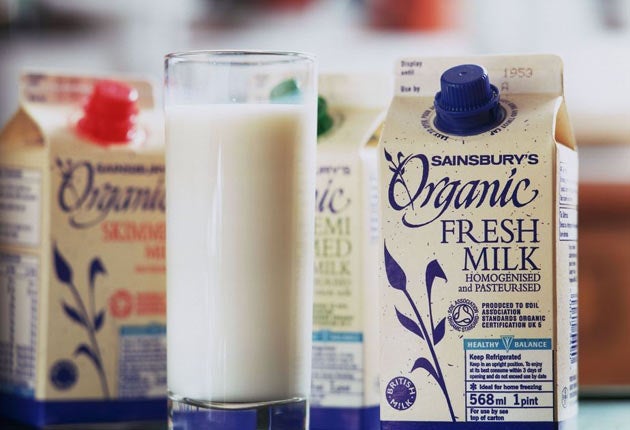Organic milk is better for you, say scientists

Your support helps us to tell the story
From reproductive rights to climate change to Big Tech, The Independent is on the ground when the story is developing. Whether it's investigating the financials of Elon Musk's pro-Trump PAC or producing our latest documentary, 'The A Word', which shines a light on the American women fighting for reproductive rights, we know how important it is to parse out the facts from the messaging.
At such a critical moment in US history, we need reporters on the ground. Your donation allows us to keep sending journalists to speak to both sides of the story.
The Independent is trusted by Americans across the entire political spectrum. And unlike many other quality news outlets, we choose not to lock Americans out of our reporting and analysis with paywalls. We believe quality journalism should be available to everyone, paid for by those who can afford it.
Your support makes all the difference.Britain's beleaguered organic sector receives a boost today with a study that suggests organic milk is healthier than the ordinary variety.
The European Union-funded study analysed 22 brands sold in supermarkets and found that organic milk had lower levels of harmful saturated fats and more beneficial fatty acids than conventional milk.
While the Newcastle University study stopped short of saying that consumers should switch to organic milk, the lead researcher, Gillian Butler, made that recommendation when discussing her research.
The peer-reviewed paper said the health benefits were present all year round rather than just during the summer, as indicated by research carried out by the same team three years ago into the quality of milk on 25 farms.
It contradicts the Food Standards Agency's (FSA) verdict four years ago that organic milk could contain higher levels of short-chain omega-3 fatty acids but that they were of "limited health benefit" compared with the long-chain acids found in oily fish.
Last year an FSA-funded review by the London School of Hygiene and Tropical Medicine found that organic food, produced without chemical fertilisers and pesticides, was no healthier than conventional produce.
Consumption of organic food in Britain has slumped in the past two years amid the economic downturn.
The new study, published in the Journal of Dairy Science, sampled 22 brands, 10 of them organic, between 2006 and 2008. Mrs Butler, the livestock project manager for the Nafferton Ecological Farming Group, said: "We wanted to check if what we found on farms also applies to milk available in the shops. Surprisingly, the differences between organic and conventional milk were even more marked. Whereas on the farms the benefits of organic milk were proven in the summer but not the winter, in the supermarkets it is significantly better quality all year round."
She linked the lower quality of conventional milk to a lower reliance on grazing and chemical fertilisers' suppression of clover. Conventional milk also varied more in nutritional content.
"The results suggest greater uniformity of feeding practice on farms supplying organic milk, since there were no brands which differed consistently in fat composition," said Mrs Butler. "We were surprised to see obvious differences between the conventional brands, with the more expensive ones not necessarily better.
"Switching to organic milk and dairy products provides a natural way to increase our intake of nutritionally desirable fatty acids, vitamins and antioxidants without increasing our intake of less desirable fatty acids," Mrs Butler said. "By choosing organic milk you can cut saturated fats by 30-50 per cent."
Join our commenting forum
Join thought-provoking conversations, follow other Independent readers and see their replies
Comments